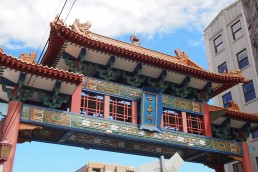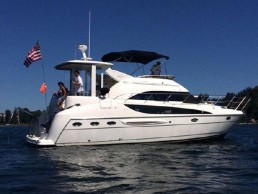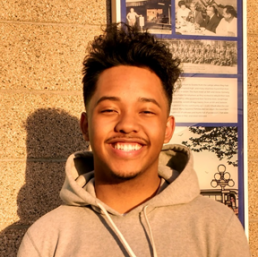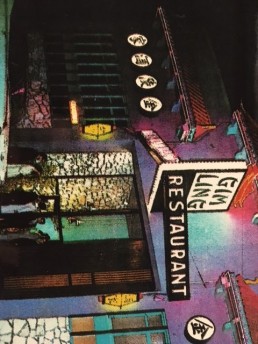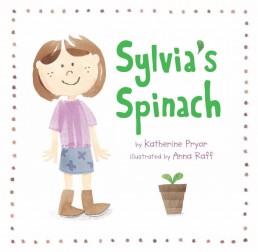2017 Chinatown-International District Public Safety Survey Findings
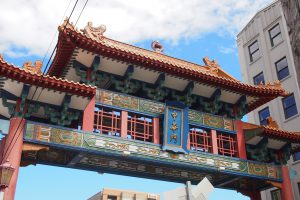
InterIm CDA in partnership with Seattle Chinatown International District Preservation and Development Authority (SCIDpda) developed a public safety survey to evaluate the community’s perceptions of public safety, police-community relations, and various public safety interventions. The survey was conducted in 2017 from February to March in English, Chinese, and Vietnamese.
Detailed results of the survey can be found here. A brief one page fact sheet of the survey can found here (Chinese and Vietnamese).
If you would like results of specific questions, please email Jamie Lee at SCIDpda.
We Shall Not Be Moved: Make your voice heard to Seattle City Council
Make your voice heard to Seattle City Council

CALL TO ACTION: Join us next Tuesday, July 18, at NVC Memorial Hall, to show and voice your concern about the immediate threat of displacement and gentrification of Chinatown-International District before Seattle City Councilmembers. Interpreters will be present. The City Council is making decisions about development in this neighborhood. This is your opportunity to learn about and influence those decisions and help us stop displacement now.
What: We Shall Not Be Moved Town Hall
When: Tuesday, July 18, 2017
Time: 5:00 PM – 7:30 PM
Where: Nisei Veterans Committee (NVC) Memorial Hall,
1212 South King St., Seattle, WA
Contact: Henry Liu, hliu@interimicda.org, 206-624-1802 x21
The City Council is expected to vote later this month on passing Mandatory Housing Affordability. At the town hall, the Chinatown-ID community will express concern about having anti-displacement tools and policies in place that will protect and preserve this uniquely very low-income community, which has historically been and still is the first home for many immigrants and refugees. The proposed rezone in the Chinatown-ID comes at a time when a runaway speculative real estate market and skyrocketing rents threaten to displace this very low-income community. 520 households over the last 20 years have been displaced and 640 more low income households are threatened to be displaced through the redevelopment of Chinatown-ID.
Please come and make your voice heard or be a warm body in the room showing your concern for Chinatown-ID.
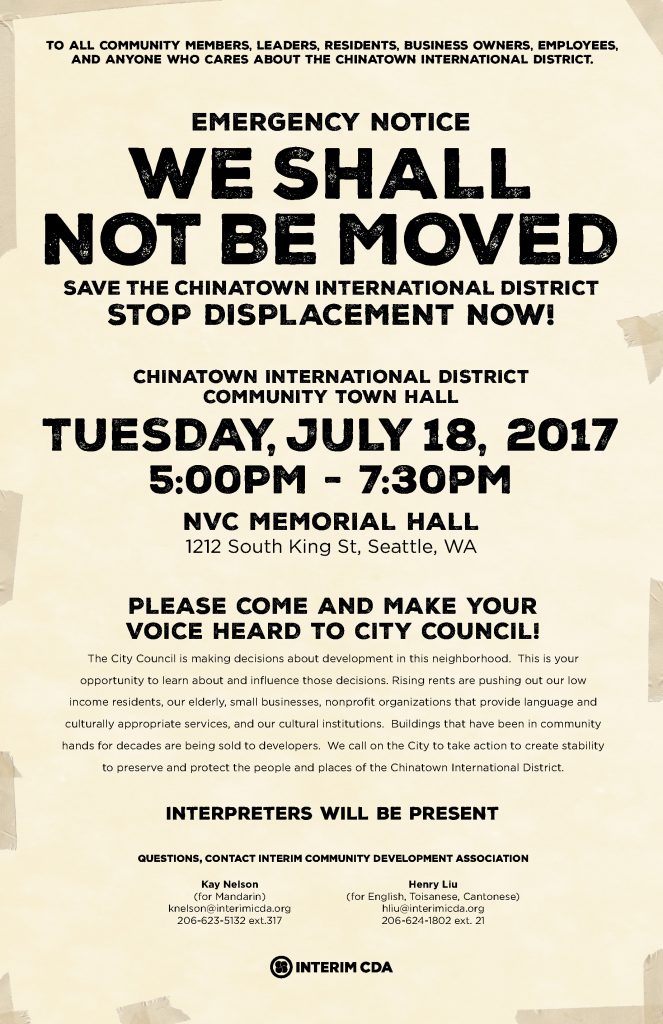
2017 InterIm CDA Gala LIVE AUCTION!
Get a sneak peak of what will be in our live auction on May 20, 2017, and get that bidding arm ready! We have unique experiences, a restaurant frenzy, an exotic vacation package and much more! (Items may not be in this order the night of the gala.)
Seattle Sounders Vs. Portland Timbers -- NEXT WEEKEND!
Next weekend, Saturday, May 27th at noon, we have the best seats in the stadium for one of the most sought after games- the Seattle / Portland match up! You and three friends will be sitting center field, just 4 rows from all the action! Change your plans, grab your friends, bring your scarves and head over to Century Link Field for an afternoon of soccer. Seattle Sounders vs. Portland Timbers Next Weekend! ITEM 1
Restrictions: Valid only for game on May 27, 2017.
Donated by: Marpac Construction, LLC
Value: $520
40’ Meridian Yacht Cruise around Lake Union and Lake Washington
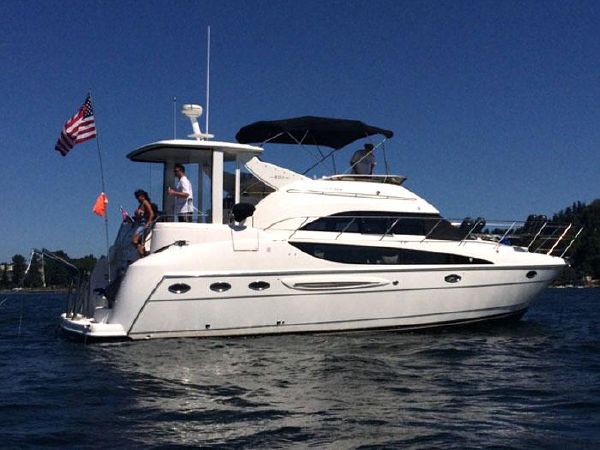
Seattle is a gorgeous city to see by turf, but it’s a spectacular city to see by surf! Enjoy the skylines and views during a two-hour Lake Union/Lake Washington cruise on the Yo’ Meridian yacht for up to eight people! Wine and appetizers will be provided to make this a perfect party experience this year on a sunny spring or summer day!
Restrictions: Cruise to take place on a mutually agreeable date, and must be used by August 31, 2017. Excludes major holidays and functions
Donated by: Craig Walker and Andrew Liu
Value: Priceless
Skykomish Cabin Getaway
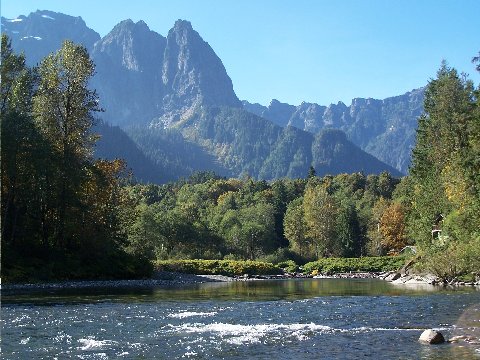
Spend two nights in a charming three-bedroom cabin on the scenic South Fork of the Skykomish River near Index, WA. The cabin is conveniently close to numerous North Cascades lakes and trails for summer enjoyment and is 20 minutes from skiing at Stevens Pass. Included in this package are two winter lift tickets for the 2017-2018 ski season at Stevens Pass Mountain Resort! Treat yourself to the great outdoors, some nature therapy, and a cozy relaxing cabin vacation!
Restrictions: Dates to be mutually agreed upon
Donated by: Gary Johnson and Karen Ko and Stevens Pass Mountain Resort
Value: $850
Hot Pot Dinner for 10 by InterIm CDA Board Vice Chair Andrew Liu
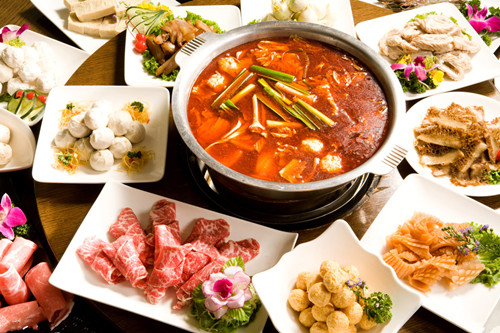
Our Vice Chair of our Board of Directors, Andrew Liu and his wife Amy Liu graciously donate a delicious and delightful hot pot dinner for 10 guests on the evening of your choice. They will host a Chinese Hot Pot (including Andrew’s special dipping sauces) at their Magnolia home where you can enjoy views of downtown Seattle and Elliott Bay. Wine will be provided. This auction item makes its seventh appearance due to its popularity! Don’t miss out!
Restrictions: Date to by mutually agreed on.
Donated by: Andrew Liu
Value: $800
One Week in Two-Bedroom Vegas Villa
Head on down to Vegas from January 6 - 13, 2018! Enjoy a two-bed, two-bath luxury villa at the Desert Club Resort that sleeps six. Just one block from the Strip, you can avoid the long transportation lines with the easy walk home! This 1,020 square foot villa has a fully equipped kitchen and dining area and includes king-sized beds, walk-in closets, a sleeper sofa, fireplace, washer/dryer, balcony and free wifi. Resort includes 5 heated pools, hot tubs, restaurants, poolside grilling stations, a putting green, fitness center, kids game room, activity center and more. As always, you have many activities and options in Vegas. On top of the typical things to do, this week Vegas is hosting the 4-day Computer Electronics Show, the largest of it’s kind. InterIm Board Vice President, Andrew Liu, is a 20+ year veteran of this show and will be your personal guide to navigating CES- helping you plan your visit to maximize your time to see the best of CES like a pro. You must purchse your own tickets to the show if you are interested. If not everyone in your group wants to see CES, it’s also the best time of year for shopping at the multiple Premium Outlets because everything is heavily discounted after the new year! Even the tourist attractions are easy to see because almost everyone is at the show. One Week in Two-Bedroom Vegas Villa
Restrictions: Valid only for January 6-13, 2018. Airfare and CES admission not included.
Donated by: Andrew Liu
Value: $2,400
Restaurant Frenzy!
Get that bidding arm ready to take home gift cards to some of Seattle’s finest dining experiences!
- Maneki: $100 – Established in 1904, Maneki is Seattle’s oldest Japanese restaurant and is located in the Chinatown-ID!
- Green Leaf Vietnamese Restaurant: 2 gift cards at $50 each – With locations in Chinatown-ID, Belltown and Bellevue, you can’t go wrong with this authentic, delicious Vietnamese favorite!
- Girin: $100 – Korean fried chicken is all the rage, and Girin has got it, as well as many other Korean dishes! Located in Pioneer Square.
- Ethan Stowell Restaurants: $100 – This is good at any Ethan Stowell restaurant: Anchovies & Olives, Ballard Pizza Co., Bar Cotto, Bramling Cross, Goldfinch Tavern, and How to Cook a Wolf.
- Columbia Tower Club: Dinner for two with wine pairing: Spoil yourself with a delicious dinner at the best view in Seattle atop the Columbia Tower!
Live Edge Beverage Table by Thao Tran
At the Fallen Trees company, the design, and fabrication is all done one piece of furniture at a time by Thao Tran in Seattle. With a Fallen Tree piece, you're buying furniture that's solid, sustainably sourced, and has a story to tell. This coffee table is made from a salvaged Lychee fruit tree from Maui, Hawaii. Forget coffee, you put your Lychee Martini on this one of a kind table. You can take this unique and beautiful Fallen Tree coffee table home tonight! (Picture coming soon!)
Donated by: Thao Tran
Value: $3,500
Poker Party for 20 People
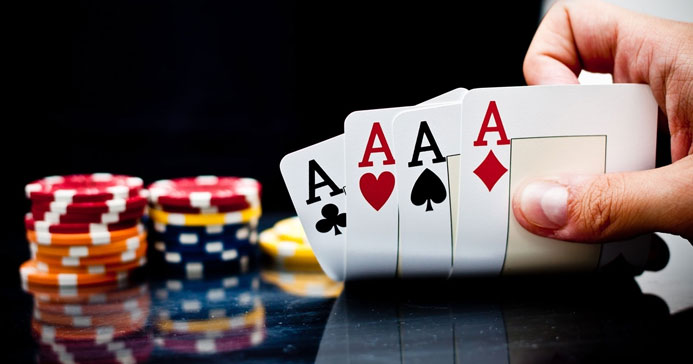
The first 20 bidders at $75 earn a seat at the table to try their luck and test their skill at Andrew Liu’s house. This is a real poker tournament with prizes! Play will consist of 20-minute rounds with multiple buy-in options. If the thrill of pocket aces isn’t enough, you’ll feel good knowing the food and drink are provided, and of course that all the proceeds benefit InterIm CDA!
Restrictions: Party on September 16, 2017
Donated by: Andrew Liu and Liana Woo
Value: $75 a seat
Chinatown-International District Extravaganza
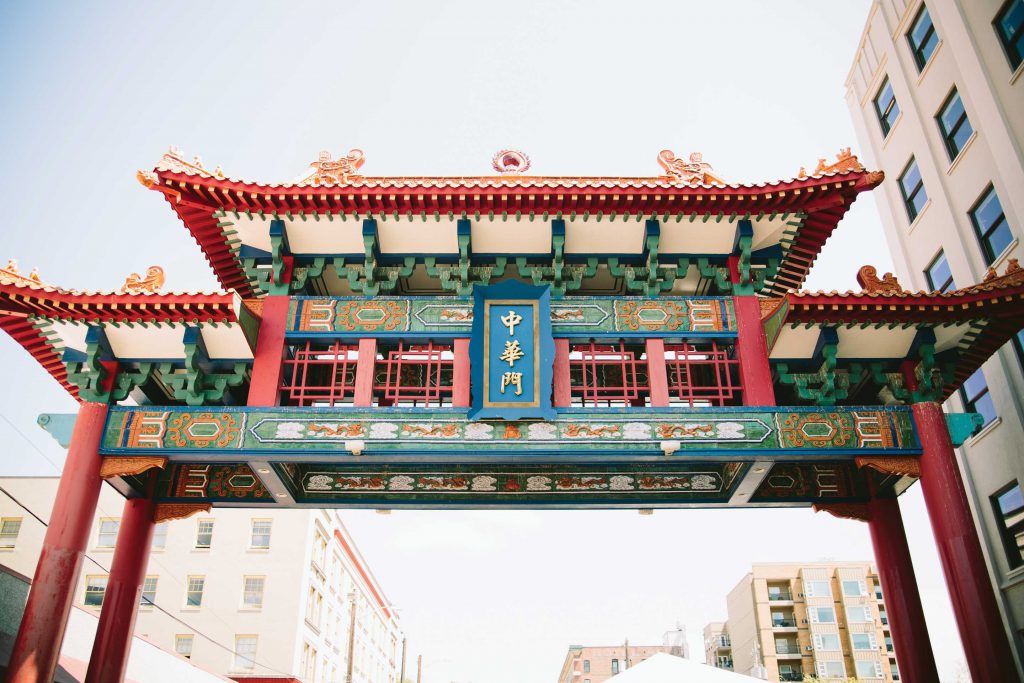
Whether you’re a CID local or new to the neighborhood, as the winning bidder, you’ll have the opportunity to sample the best food, shopping, culture, art and even tattooing (!) in the neighborhood with the Chinatown-International District package. You'll get certificates to experience the lifestyle of Seattle's CID! While exploring the CID, you get a 10 to 15-day parking pass in the InterIm CDA parking lot under the freeway!
Donated by: Hing Hay CoWorks, Beijing Arts, goPoke, InterIm Parking Lot, Kaname Izakaya and Shochu Bar, KOBO, MoMo, New Century Tea Gallery, Phnom Penh Noodle House, Pioneer Barber Company, Seattle Best Tea, Seattle Pin Ball Museum, Tai Tung Restaurant, Thai Curry Simple, Tiger Tiger Tattoo, Tsue Chong Company, Tuesday Scarves, Wing Luke Museum, World Pizza
Value: $1,333
Summertime Himalayan Dinner Party for 10

Join InterIm CDA Executive Director, Pradeepta Upadhyay, and special guest Rep. Sharon Tomiko Santos for a scrumptious summer Himalayan/Nepali dinner party for 10 people! Pradeepta will be your host and chef and will treat you to a feast and drinks in her beautiful backyard! Whether you’re a newbie to Himalayan food or it’s a staple of your diet, this authentic dining experience – and the company you will be in – is not to be missed!
Restrictions: to occur in the months of August and September of 2017
Donated by: Pradeepta Upadhyay and Rep. Sharon Tomiko Santos
Value: $800
Seven-Night Hawaiian Vacation with Hawaiian Airline Miles

Included in this package are 80,000 Hawaiian Airline miles and seven nights at a spectacular ocean view, two-bedroom, two-bathroom condo at the Hilton Hawaiian Village: Lagoon Tower! This 1,025 square-foot unit accommodates six guests and has a living room, separate dining area, TV with cable, PlayStation, and a full kitchen. Fans of the TV show Hawaii 5-0 will recognize the Lagoon Tower plus the Rainbow Tower as being prominently featured in the opening credits and many episodes. Pack your bags, and say, “Alooooooha!”
Restrictions and more details: No blackout dates; guests can book as far as nine months in advance; a refundable $250 damage deposit fee is required upon arrival; parking is $42 for valet per day and $35 for self parking per day. Lodging and airline miles can be used separately.
Donated by: Hawaiian Airlines and Wilfred James
Value: $5,450
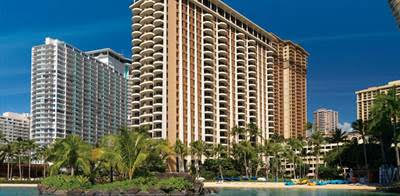

Meet Our 2017 WILD Fellows!
The WILD Fellowship was created in order to provide a culturally-responsive, experiential leadership development program for youth ages 16-18. The purpose of the program is for youth to learn more about Asian Pacific American (APA) history, process current events, and ultimately make a positive impact on the Chinatown-International District. In addition to learning how to facilitate and lead groups of peers (and elders), Fellows develop advocacy skills, learn about local APA activism and movements, plan outdoor trips, and work together on a community-based environmental justice project. Upon completion of the program, Fellows are then qualified to move on as WILD interns.
This year, the Fellows chose to help construct a retaining wall in InterIm CDA's Danny Woo Community Garden to benefit our elders who garden there. They will also be painting an art mural with an environmental justice focus for the Children’s Garden toolshed. Meet our 2017 Fellows:
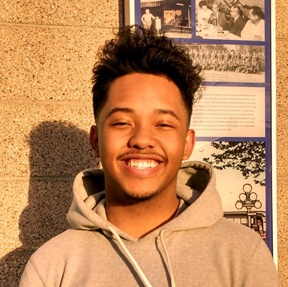
Ellington Taylor is a senior at Franklin High School and is half black, half Filipino. He likes to play basketball and chess.
“I joined the WILD Fellowship because I want to help my community. I'm always in Chinatown, so why not improve the area while I'm in it?”
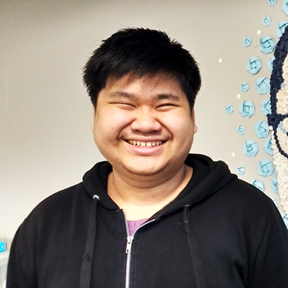
Han Xing Ye is a junior at Garfield High School. He is Chinese and from Taisan.
“I joined the WILD Fellowship to learn more about our community and systems. While doing that, I also earn some money. I hope that we will be able to make a positive impact on our community and hope to get a better idea of what we need to change.”
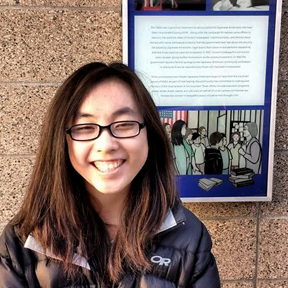
Jenny Liu is a junior at Garfield High School. She enjoys spending time outside in nature.
“I’m a part of the WILD Fellowship because I like learning more about my community and things about the environment. I hope to gain more leadership and outdoor skills through the fellowship.”
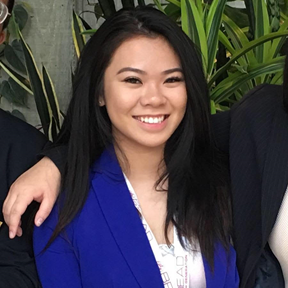 Karmen Deng is a sophomore at Garfield High School and is in her second year at WILD.
Karmen Deng is a sophomore at Garfield High School and is in her second year at WILD.
“I joined the WILD Fellowship to make new friends and learn more about my community. By attending this fellowship, I hope to learn more about Seattle by going on the fun field trips we have!”
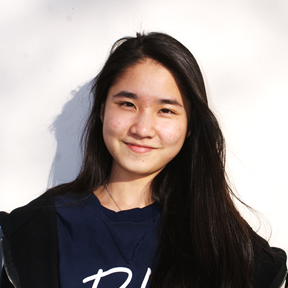 Mina Liu is a junior at Garfield High school.
Mina Liu is a junior at Garfield High school.
“I’m a part of the WILD Fellowship because I think it will be an awesome experience and can grant me valuable leadership experiences. I care about our environment and want to learn more about our community and contribute back what I can.”
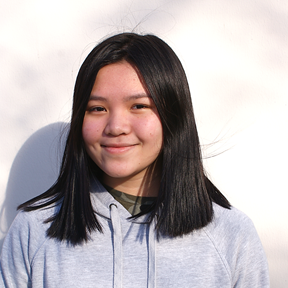
Tinh Lou is a sophomore at Franklin High School.
“I joined the WILD Fellowship because I want to be more involved in the community. I want to help change the air quality of the International District.”
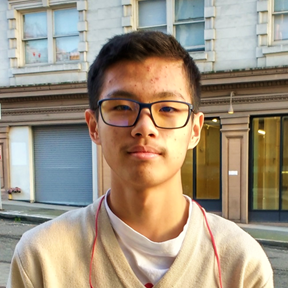 Zhi Min Yan is a senior at Garfield High School.
Zhi Min Yan is a senior at Garfield High School.
“I joined the WILD Fellowship because I want to learn more about my community and how I’m able to give back to my community for how much it has given to me. What I hope to accomplish in the fellowship is to be more connected to my community.”
InterIm CDA's Statement of Commitment to our Community of Immigrants and Refugees
InterIm CDA
Statement to Public and Media
For immediate release: Monday, March 6, 2017
Contact: jwasberg@interimicda.org
For nearly fifty years, InterIm CDA has been standing up for social justice issues and rights of immigrants, refugees, and people of color from marginalized communities. In that five-decade history, the last few weeks have delivered some of the most extreme, frightening, and xenophobic blows affecting not just those we serve, but several of us on staff.
With each passing day, our communities are afraid and worried about the hateful rhetoric and violence directed towards Muslims, immigrants, refugees, LGBTQ people, women and communities of color. We must come together to respond to this hateful rhetoric and work together to protect our vulnerable communities whose very existence and dreams for a secure life in America have been shaken and threatened.
It is more important now than ever before to continue working together and to build strong empowered communities, and to broaden our collaboration and partnerships to fight against the perpetration of injustice and violence which is engulfing the communities we belong to and serve.
From the residents in our affordable housing buildings, to the families and individuals who come to us in need of safe, stable housing, our survivors of domestic violence, and our youth, we will care for our community of immigrants, refugees, children and grandchildren of immigrants and refugees.
At InterIm CDA, we are committed to building a cohesive movement to fight this hate, by continuing our efforts to reach out to other POC/immigrant/refugee organizations, LGBTQ advocacy groups, and organizations and coalitions against gender-based violence. We will continue to come together in a movement of resistance, and not allow fear to overcome us.
And we will pro-actively reach out to those who serve other ethnic populations to build new bridges and stand together in solidarity against the heinous policies aimed directly against immigrants and refugees – the travel ban, threats of cutting off sanctuary cities, and the inevitable Muslim registry. If they are targeting any one of us alone, they are targeting us all. We stand strong with all immigrants, refugees, and people of color.
On Wednesday, March 1, we held a Know Your Rights Workshop at the 601 S. King Street office, in the WILD office for staff, other organizations, our building managers and partner agencies. Immigration lawyers provided information regarding rights as citizens, legal residents, and people who are in the middle of having their status changed. The attorneys taught us how to respond to any unwanted incident which may occur with our clients or tenants in our buildings, in relation to the current immigration and refugee crisis which has erupted after the Executive Order was signed.
We thank Attorney General Bob Ferguson for his and his staff’s leadership in the country in fighting back against the unconstitutional travel ban and winning in federal court. We thank Governor Inslee for the executive order enacted to provide safety to immigrants and refugees who are at risk due to new federal immigration laws. We thank Mayor Murray and the Seattle City Council for declaring Seattle a sanctuary city. To all who are standing up on behalf of at-risk immigrants, refugees, and people of color – and for the dignity of our country – we thank you!
We will not allow ourselves to be intimidated by the challenges that lie ahead of us; we will work hard to honor our commitment to our mission and core values to ensure America is a welcoming, safe and loving county which allows all people to live with respect and dignity irrespective of their religion, color, gender or race.
We will not allow fear to overcome us!
Voices of the CID: Alison Sing's Essay
InterIm CDA recently interviewed Mr. Alison Sing for our Voices of the CID social media project, for which we interview people who have a close connection and/or personal history in the CID and share their thoughts with us on its value in their lives. We appreciate the time and effort Mr. Sing put into his interview and have posted it in its entirety.
What is your connection/affiliation with the CID?
My family has strong ties with Seattle’s Chinatown District. I was born on October 19, 1946. My twin and two younger brothers along with my parents live in a tenement apartment on 7th Avenue where the former Silver Dragon Restaurant was located and my father parked his car in the garage that became the first home for the Wing Luke Museum.
As a young man, my father, James Sui Sing lived and worked in the Chinatown restaurant district for most of his entire adult life. In his younger years, he drove a taxi and worked as a printer in a small print shop on Canton Alley. He also worked as a clerk for the Frye Meat Packing company. At one point, when the Frye Meat Packing Company was laying off their employees, my father asked why he wasn’t being laid off. The response he received from his manager was why would they laid off one of their most productive employee.
My father’s restaurant career began in the early 40’s with the Louie’s Chinese Garden Restaurant. This restaurant was located on 516 - 7th Avenue S. next to the Chong Wah Benevolent Association. In the early 1950’s my father and his partners purchased and remodeled this restaurant into the famous Gim Ling Restaurant. He obtained one of the first-Class H Liquor license in Chinatown. The restaurant was very popular among returning Korean War service members. The old band stage and private booths along the length of the dining room was eliminated and open seating was added. The restaurant had a second-floor balcony and a separate dining room for private parties. The cocktail lounge provided a cozy place for small talk and libations.
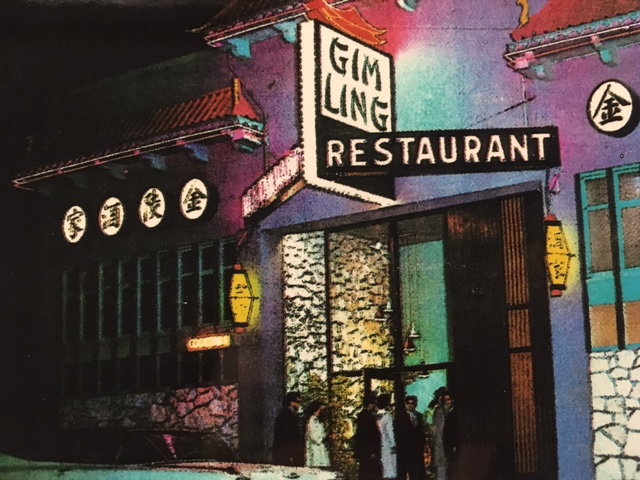
As children growing up on Beacon Hill, we frequently accompanied our father to the restaurant while he performed various business errands prior to the formal opening of the restaurant for the evening hours.
At one point in the history of the Gim Ling Restaurant, former President Harry S. Truman dined at the restaurant after visiting with Seattle dignitaries. He even signed one of our restaurant menus. When I was older, I assisted my father serving as a cashier and hat-check duties. I remember the famous Actor John Carradine, father of David Carradine (young grasshopper) from the famous Kung Fu TV Series visiting our restaurant. While enjoying libations in our cocktail lounge he and another customer got into a heavy argument and the Seattle Police was summoned to break up the dispute. That was heady stuff of a young person to witness.
As a child, I remember sitting up on the second floor of Chong Wah (Chinese Benevolent Association building watching the black and white newsreels of Communist China shelling the islands of Matsu and Quemoy in the mid-50’s. My father was a member of the Chinese Nationalist KMT Party (Kuomintang) ruled by Chiang Kai Shek on the island of Taiwan. Like many Chinese immigrants, they supported the new Republic founded by Dr. Sun-Yat-Sen.
My father also served as the Overseas Secretary for the KMT. Although he yearned for the reunification of China under the KMT; in his later years, he accepted the progress made on the Chinese mainland and was proud of the Chinese athletes who participated in the World Olympics.
My other strong connection to Chinatown was attending Chong Wah’s Chinese school. We joined other Chinese children to study, read and write Chinese. We recited Chinese proverbs to strengthen our Chinese-Cantonese fluency; we practice writing Chinese calligraphy and we read from simple Chinese readers.
Because my father owned the Gim Ling Restaurant next door, the chefs made us a simple turkey/chicken sandwich for our dinner. My father would take us home after school before returning to his duties at the restaurant.
Our parents were informed by local school officials that our continued participation in the Chinese school was interfering with our public education; my parents decided to forgo our Chinese education and focus on our American studies.
My final connection to the ID came as a college UW graduate seeking job opportunities late 1971. After visiting the King County employment program housed in the Smith Tower, I was walking back to the ID and passed by the Interim offices housed in the NP Hotel on 6th Avenue. I recognized Don Chinn and stopped by to pay my respects. He said a group of Japanese Churches were very concern about the pending layoffs at Boeing and many of their Nisei parishioners were on the potential lay-off list. I decided to attend an upcoming meeting with the organizers that led to my volunteering to help open the Employment Opportunities Center (EOC) that fall. This was the first Pan-Asian non-profit organization to use bilingual/bicultural staff in the Pacific NW for their employment services. We operated in the ID until our Southeast Seattle Model Cities grant was funded and then we moved to our new service area in the Rainier Valley (Columbia City location). This program operated successfully for 25 years; it later devoted a variety of services to our Asian immigrant population. The demonstrated success of the EOC program led to the creation of other Asian social service programs, such as, ACRS, Denise Louie Education Center, Bilingual ESL program, Center for Career Alternatives, Keiro Nursing Home, Chinese Information Service Center, etc.
My involvement with this program led to a public services career with the Washington State Employment Security Department and Snohomish County government. I retired from public service in 2005.
Do you have any favorite stories, memories, or experiences in the CID?
As a child, our parents took us to Chinatown frequently to shop and visit with friends. We enjoyed eating dim sum at Tai Tung. My father would have his afternoon coffee at the main counter and we all would share a piece of the sweet rice pastry among the four boys.
I also remember visiting the Tsue Chong Co. were my mother worked making fortune cookies. J. P. Patches, a Seattle Children’s morning TV program filmed a short segment 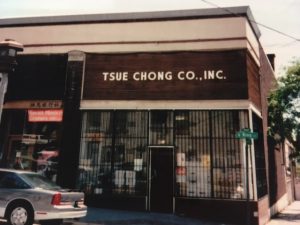 about the making of fortune cookies. We were able to watch this famous segment at 7:30 am on Channel 7 before starting school.
about the making of fortune cookies. We were able to watch this famous segment at 7:30 am on Channel 7 before starting school.
As an adult, I would periodically stop by Tsue Chong to buy a 5lb bag of “Unfortunate Fortune Cookies” for my family. These were broken fortune cookies or fortune cookies that did not meet the standard for sale in commercial grocery stores.
As a kid, I remember coming to Chinatown to buy Chinese preserved fruit candy at Wah Young and the corner store on King and 7th. When our parents paid a visit to one of these stores, the owners would always give us a small treat. My father did extensively business with Wah Young who provided many of the restaurant staples for my father’s Gim Ling restaurant.
There was a live poultry shop on the south side of King Street at the entrance to Canton Alley, my parents frequently purchased fresh chicken here. During the 50’s poultry shops were prevalent and you would ply one of these live poultry shop if you wanted serve chicken dinner. The store clerk would select a live chicken from one of the Chicken coops and then butcher the chicken while you waited. Our parents would chat with the owners while they de-feathered the bird, remove the intestines and clean the bird for packaging.
I remember the slaughtering process of the chicken was a 15-20-minute wait. The store clerk would remove the chicken and cut the throat and place the chicken in large garbage container to drain the blood from the chicken. Then the chicken was retrieved and de-feathered and had its intestines removed and these parts were wrapped along with the chicken for my parents to take home for cooking.
In those days, grocery stores did not offer many choices in fresh meats; one had to go to a butcher or poultry shop for their fresh meats. Sometime in the mid-50’s, the Health Department banned the operation of live poultry shops for sanitation and health reasons. The only shops permitted to offer meat or poultry were the BBQ shops that are heavily regulated by the Health Department.
On one of our weekly family trips to Chinatown, we encountered a life & death situation where a man had barricaded himself in the live poultry shop where we bought our fresh chickens on King Street (next to Canton Alley). This was one of those human dramas that brought all the Chinese residents out on to the street. People were standing where the Four Seas Restaurant parking lot is now watching the drama unfold. I don’t know if the man had threatened anyone but he had access to all the meat cleavers and butcher knives in the shop. The Seattle police was called in to resolve the situation. There were no “Swat Team” or “Hostage Rescue Squad” in existence to manage the situation. We only had the normal street patrol units and precinct command staff to manage and control the situation. Efforts to induce the man to give up failed, the police resorted to using “gas” canisters to drive the individual into submission. I never found out what happened to the man.
Every summer, Seattle celebrated Seafair and one of our favorite events was the annual Chinatown Seafair Parade that started on East Jackson and meander down Jackson turning left at either Sixth or Maynard Avenue and turning left up King Street before turning right on Seventh Avenue toward Weller Street. Parade officials set up a reviewing stand on Weller Street next to the Chinese Benevolent Association building to host Seattle and Chinatown dignitaries. The parade formally ended on Seventh just before they reached Dearborn Avenue.
The venue for the parade route changed in the latter years, when the parade continued straight up King Street and finished near the Chinese Baptist Church. The streets of Seventh Avenue, Weller Street and Maynard south of King Street were set up in a carnival atmosphere with many booths. This was a wonderful event for visitors to wander up and down enjoying the summer festivities. I am not sure what the full impact was for local merchants. But this drew thousands of people into Chinatown.
When we were very young, my parents reserved places right in front of the Gim Ling Restaurant for us to watch the parade. As we got older and had our own families, we would find our own viewing places on Jackson Street. One of the major highlights was the Seattle Chinese Community Girls Drill Team along with Seattle Seafair Clowns and Pirates.
I also remember Chinatown hosting various Street Festivals which help to promote the area.
What makes the ID special to you?
For me, the Chinatown/International District will always provide a sense of “place” for those of us of Asian descent. This was a place where our first and second generation parents conducted their business. Where they could speak their native tongues, and feel at home. This was a place that allowed our ancestors to respect and observe their own culture.
However, this inward focus began to erode our abilities to tackle societal problems. In the 70’s the younger Asian community leaders recognized that we could no longer solve all our societal issues internally without embracing modern forward-looking solutions. We also recognized the need to engage in local politics not just as observers but to actively participate in the local governance process.
From this nascent period, several Asian focused non-profit entities were created to provide the growing needs of social services to our Asian brothers and sisters.
Modernization of the Chinatown and International District must continue while preserving our cultural and historic places. As Seattle’s economy continues to grow, the greatest threat to the CID is the land that it sits on. This is prime real estate given its location and proximity to local transportation access; such as light rail, Amtrak, Sounder Train and urban bus routes.
New strategies must be formulated to protect the land and the historic buildings. Major investments must be pursued to modernize our existing buildings while infusing them with new uses. We need to promote the formation of more local businesses in the ID while preserving its unique characteristics. New innovative strategies must be found to provide more parking or increase access to the CID. Perhaps, creating a walkable CID with no vehicles is another way to generate more inviting space. Our younger generations, such as the millennium are more comfortable walking. Creating a more family focused ID could help to attract and create new memories for younger generations of Asian children who are the future protectors of this place called the CID.
Focus on creating a more welcoming and gathering place for younger Asians to connect with their cultures and history.
What do you wish people knew about the CID?
When I was growing up, encyclopedia references, such as the Encyclopedia Britannia, World Book, and the Book of Knowledge were some of the resources that we used to find subject information. With the advent of Wikipedia, the online source for information by savvy online users; that has become the newest go to source. In the State of Washington, HistoryLink.org founded by Walter Crowley of Seattle’s Underground fame is now a great local resource on things Washington.
Recently in doing some local research, I found several interesting articles on the history of Asian in Pacific Northwest. However, articles about our own Asian history in the Pacific NW and about the CID are far and few. I believe Washington State history is no longer required in our public-school systems. Very little about our local ethnic history is taught or even available to our children. If our children do not have access to these stories how can they see any connection to the CID.
We need to find a way to encourage more writers to submit information to HistoryLink.org. Perhaps, Interim CDA and others could develop a list or subjects for more individual research. These articles could then be posted onto the HistoryLink.org website. Wing Luke has gather a lot of historical information on many of our pioneers. What is news today will be history tomorrow. Perhaps, our own community could create a new website formatted such as HistoryLink.org where we could post our own stories. If such a site where created, we could use it to inform more people about the CID and contributions made by our Ancestors.
I know what I am suggesting may be counterintuitive to the mission of the Wing Luke Museum’s effort to capture such stories where a paid membership provides you access to this information. Such historic information should be freely provided to the public and especially to member of the Asian community. The free flow of information is the real key for the future of the CID.
Additional resource references:
http://www.historylink.org/
What do you wish for the future of the CID?
It is my true wish that the Chinatown/International District become the “destination” site for visitors and a grand “gathering” place for our residents but more particularly for our children of Asian descent. A place where they could take their children to visit and to imprint pride in their own culture as well as all other Asian cultures. I hope the future CID becomes a place that draws all kinds of talented Asians together to market their intelligence and creativity.
It would be wonderful, if an Asian Creative and Performing Arts Center could be created within the CID that would allow Asian artist to showcase their talent and skills as performers. This would include theatre screening of new Asian artistic materials and films.
I included this comment in one of the earlier question; but, I think it might be worth mentioning again.
The CID would be an ideal as a pedestrian center focus area. The elimination of vehicles would open the area for show-casing the arts and crafts of our various Asian cultures. This would attract many more people to the CID and would create a safe environment for families to bring their children to explore the CID. This would be “destination” site like the Pike Street Market. Why can’t the CID develop a “Night Market” environment.
If we expand the entertainment options and create an environment of an open market like those in Asia; this could increase the economic benefits to the entire area.
Public transportation access would have to be a key. However, with Uber and Lyft type options being available; this could attract more of the younger generation to the CID but also give younger Asians options to start their own businesses in CID.
A “futures conservation” fund should be created to purchase and hold the land in the CID in a trust for future generation. This would be like the Land Conservancy Trust Funds that are used to protect public lands for future generations. Ownership under such trust funds could be the springboard for creative development options while ensuring preservation of the CID’s uniqueness and cultural value.
Health Experts, Community Groups Release Sweeping New Healthy Community Action Plan for Seattle's Chinatown-International District
Contact:
Jill Wasberg, jwasberg@interimicda.org, 206-624-1802 x31
Sian Wu, sian@resource-media.org, 206-374-7795 x102
HEALTH EXPERTS, COMMUNITY GROUPS RELEASE SWEEPING NEW HEALTHY COMMUNITY ACTION PLAN FOR SEATTLE’S CHINATOWN-INTERNATIONAL DISTRICT
CID residents in poorer health than rest of city, report finds; Swedish an early supporter of investments to reduce stark health disparities
SEATTLE -- Today InterIm CDA and a group of health and community organization partners, released the 2020 Healthy Community Action Plan, the first comprehensive health data compilation and forward-looking directive to address the housing, public health, social services and economic development challenges of Seattle’s Chinatown International District (CID). Focusing on equitable health outcomes, the Plan provides concrete actions for the City of Seattle, and current and potential outside funders, to implement proven, data-driven strategies to improve the health and well-being of CID residents.
“People all over the region love to come to the CID to eat and shop—thanks to the neighborhood’s small, independent businesses. The CID is a local treasure, but it’s not an amusement park. This historic neighborhood is home to a community of immigrants, seniors and young children who face a unique set of barriers to health, social, and economic success,” said InterIm CDA executive director Pradeepta Upadhyay. “Seattle is experiencing an enormous economic boom right now, so it’s important to make sure that CID community members don’t get left behind, and get the same chance at a healthy life that Seattleites in more prosperous neighborhoods have.”
The report details startling but long-brewing health disparities between the CID and other neighborhoods in Seattle and King County:
- The life expectancy of CID residents is seven years shorter than the longest life expectancy in King County;
- Diabetes is the leading cause of death in the CID. People living in the CID have some of the highest prevalence of smoking, high cholesterol, high blood pressure and no physical activity;
- More people report having symptoms of poor mental health in the CID than elsewhere in King County.
“The data are clear, more needs to be done with the CID to address the health disparities that are impacting this wonderful community,” said Patty Hayes, Director of Public Health - Seattle & King County. “We have a tremendous opportunity to build upon our collaborations with parks, housing agencies, city planners and community organizations to implement new solutions to help solve the public health crisis facing the CID.”
The Plan also reports environmental challenges facing the CID:
- The CID has the least amount of open and green space per person compared to any other neighborhood in the city;
- Poor air quality contributes to more asthma, respiratory and cardiac-related hospital visits per capita than 99 percent of other Puget Sound neighborhoods. The CID is bisected by I-5, which has the highest traffic volumes in the Pacific Northwest.
As a part of the Plan, InterIm CDA met with residents and community members to discuss their aspirations for a healthier neighborhood. During the community engagement process residents reported experiencing chronic stress, social isolation and sedentary lifestyles as a result of the poor social and environmental conditions in the neighborhood. The following issues were repeatedly brought up as barriers to health: feeling threatened by violence and crime, homelessness and poor environmental quality, and having limited opportunities to be active and engaged in the neighborhood.
InterIm CDA has identified nine strategies to achieve the Healthy Community Action Plan’s vision for a healthy, safe, and livable community. Already, Swedish Medical Center has committed $120,000 of grant funding to execute some of the group’s strategies identified in the Plan. Those strategies include:
- Building health and financial literacy among affordable housing residents to ensure that residents are given opportunities to be healthy and financially empowered;
- Advocating for safer and cleaner public spaces and more accessible, culturally-relevant physical and social activities and resources;
- Working with the Puget Sound Clean Air Agency to gather more data on near-road air toxics with the goal of reducing exposure to near-road air pollution.
“What drew us to become involved with InterIm CDA’s work and ultimately fund the implementation of their 2020 Healthy Community Action Plan, is our shared mission to build up a health and wellness support system for vulnerable populations,” said Sherry Williams, director of community engagement at Swedish. “When we work together to improve public safety, mental health, nutrition and physical activity, our care team can respond most effectively to improve the long-term health of urban residents, particularly seniors.”
The 2020 Healthy Community Action Plan is the result of a year-long collaboration with Swedish Medical Center, Public Health - Seattle & King County, the Chinatown International District Business Improvement Area, International Community Health Services, Seattle Chinatown International District Preservation and Development Authority and the Yesler Community Collaborative.
Link to 2020 Healthy Community Action Plan: bit.ly/healthyCID
InterIm CDA is a community-based nonprofit, with a 45-year history providing planning, advocacy, social services, affordable housing, a community garden, and environmental justice programs. InterIm CDA promotes policies and facilitates projects that bring together business leaders, property owners, residents and nonprofits to improve liveability, health and sustainability of the CID.
###
Katherine Pryor | Sylvia's Spinach Book Reading
Katherine Pryor will be joining us in the Danny Woo Community Garden during our children's summer camp on Tuesday, July 28 to read Sylvia's Spinach.
Katherine is a Seattle-based good food advocate and author extraordinaire. Her first children’s book, Sylvia’s Spinach, illustrates the “joy of growing food from the ground up and the pleasure of trying something new.” Her second book, Zora’s Zucchini, will be released August 11!
For more contact info@interimicda.org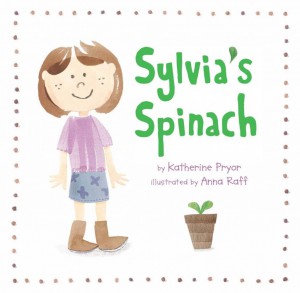
Press Release - Chinatown International District Receives National Funds

![]()
June 11, 2015
Partners in Seattle’s Chinatown-International District receive national grant award for health and housing innovation
A community-based effort led by InterIm Community Development Association (InterIm CDA), Public Health - Seattle & King County, and Swedish was awarded a national grant designed to support community collaborations to give everyone a fair chance to be healthy. The national BUILD Health Challenge grant will fund efforts to develop and deepen bonds and working relationships among neighborhood-based partners, the health care sector and local public health. The $75,000 grant will bring partners together to focus on the underlying conditions that impact health in the Seattle neighborhood of Chinatown/International District.
The Chinatown-International District project is one of 18 awardees from across the nation announced June 9, 2015. BUILD Health is funded by The Advisory Board Company, the de Beaumont Foundation, the Colorado Health Foundation, The Kresge Foundation, and the Robert Wood Johnson Foundation. Awarded projects were recognized on the strengths of their “Bold, Upstream, Integrated, Local, and Data-driven” approaches to address the social and environmental factors that have the greatest impact on health.
“This is the first time our partners have come together with a common goal of specifically focusing on improving health in Chinatown-International District based on the BUILD Health pillars,” said Andrea Akita, Executive Director of InterIm CDA. “We want Chinatown/International District to remain the heart of the regional Asian American and Pacific Islander communities. Our local and national partners all share the same goals. We know that health is improved when community members come together and create solutions in their neighborhoods for safer streets, active parks and open space, access to fresh food, and affordable housing. The effects of creating a healthier community here will ripple outward to support a culture of health in other areas.”
“I’m proud of this national recognition for King County’s commitment to promoting health in the International District,” said King County Executive Dow Constantine. “Successful partnerships tackle underlying causes, and that’s precisely why the Interim CDA’s efforts were singled out.”
The Chinatown-International District is currently home to about 3,500 people and is celebrated as the historic and cultural hub for the Asian American and Pacific Islander communities and the first American home for successive waves of immigrants since Seattle’s founding. There are more than 500 businesses employing over 8,000 people. At the same time, more of its residents are living in poverty and have poor health conditions than in other neighborhoods in Seattle. Thirty-four percent of residents live at or below the poverty level; many are low-income seniors (25% are over 65 and 42% are over 55). More young families have recently moved into the neighborhood; the number of children under age five has increased 64% since 2010.
The BUILD Health funding identifies local solutions that focus on housing, transportation, public safety and healthy food to address high rates of respiratory illnesses, heart disease, diabetes, and smoking seen in neighborhoods like Chinatown-International District.
“We are excited for this opportunity to work with our partners in moving community development forward in the Chinatown-International District. This collaboration will bring residents, businesses, and stakeholders together to foster a shared responsibility for a healthier quality of life for our community,” said Maiko Winkler-Chin; Executive Director of Seattle Chinatown International District Preservation and Development Authority (SCIDpda).
“Since our founding, Swedish has been resolved to improve the health of the region beyond traditional patient care. This translates into our commitment to charity care, research, community health and education,” said Tom Gibbon, Manager of Community Health Programs at Swedish. “Through this collaboration, we hope to apply strategies that have proven effective with other Swedish community programs and will work with our local partners to bring together clinical care, public health and community services in a coherent strategy to help meet community needs.”
“The opportunity to plan effectively for improving the community conditions that affect health answers a growing need. We will continue to support these efforts as they get underway,” said Doris Koo, lead consultant for Yesler Community Collaborative.
The full list of collaborative partners includes: InterIm CDA; Swedish; Public Health – Seattle & King County; Seattle Chinatown International District Preservation and Development Authority (SCIDpda); Friends of Little Saigon; Vietnamese Friendship Association; International Community Health Services (ICHS); and Yesler Community Collaborative (YCC).
Together, partner organizations will convene agencies across service systems; engage residents, property owners and businesses; improve health and wellbeing by addressing the barriers faced by immigrants from many places living in the same area; collect and analyze qualitative and quantitative data; and measure and evaluate progress.
The BUILD Health Challenge was founded to encourage community partnerships among local non-profit organizations, hospitals and health systems, and health departments to improve the health and well-being of their residents.
Contact:
Jill Wasberg, InterIm CDA, 206-624-1802 ext. 31
Sharon Bogan, Public Health - Seattle & King County 206-263-8770
###
Download: Press Release - Chinatown International District Receives National Funds
2015 Growing Communities Awardee Announcement
Honoring the Ing Family: 2015 Bob Santos Leadership in Sustainability Award Recipient
The Bob Santos Leadership in Sustainability Award is presented to an organization or individual whose "leadership in sustainability has had a positive impact on communities of color by promoting affordable housing, equity, environmental justice and cultural continuity."
InterIm Community Development Association is proud to present the 2015 Bob Santos Leadership in Sustainability Award to Joey Ing, in honor of the Ing Family – Joey, Joel and posthumously, Vera. The Ing family has contributed to lasting change through their gifts of time and talents, through their leadership, mentoring and support of community leaders across many generations.
The award has been given in the past to Doris Koo, Martha Choe, Norman Rice, and Sue Taoka. This 2015 award will be presented to Joey Ing at InterIm CDA’s Gala on Saturday, May 2, 2015 at the Seattle Marriott Waterfront, 2100 Alaska Way, Seattle. Reception starts at 5:30 PM with dinner at 7:00 PM.
It was the summer of 1959 when Vera Chan attended a friend’s wedding and was introduced to Joey Ing, a young architecture student from Hawaii. Joey asked Vera out. She said yes. One year later, they were married, a fifty-three year love affair that lasted until Vera passed away last year. In the 1960s, while Joey began to establish his career as one of the city’s creative architects, Vera’s world centered around raising a family. In a relatively short period of time, Vera gave birth to three children--JaDeane, Joel, and Jeffrey.
In the 1970s, when the Ing children were old enough to go to school, Vera decided to go to school as well. She was about a generation older than most of her fellow students but this didn’t stop her from earning a Bachelor of Arts degree in urban planning. In fact, she was inspired by the student activists who attended school during the day and brought back their expertise to preserve and revitalize the International District--to fight for better housing, social services, arts and culture, street improvements, and restoration of historic buildings. With her background in urban planning and her affinity for the neighborhood of her childhood, Vera wanted to use her skills in the overall effort to preserve the International District.
During what she described as the “golden era of Asian activism” from the 1970s through the mid 1980s, Vera became engaged in the preservation on the International District. She joined the board of Inter-Im where she served alongside such community leaders as Tomio Moriguchi, Ben Woo, Shigeko Uno, and Dolores Sibonga to support the leadership of “Uncle Bob” Santos and his young dedicated staff. Eventually Vera would serve as Board President during a highly productive time for Inter-Im when demonstration projects such as a mental counseling project, a community clinic, a day-care project, a tenant services project, and a community pea patch program would lead to establishment of the Asian Counseling and Referral Service, International Community Health Services, the Denise Louie Education Center, the International District Housing Alliance, and the Danny Woo Community Garden.
During these formative years, Joey’s career flourished. He became the “go-to-guy” for restaurant design and layout, earning praise and popularity for such eating establishments as the iconic Thirteen Coins, Louie’s Cuisine of China, and Anthony’s Restaurants. But Joey was a community activist in his own right. He was a charter member of the International District/Chinatown Special District Review Board. He designed the International District’s Children’s Park. And according to Uncle Bob (in his book Hum Bows Not Hot Dogs), it was Joey who developed the layout for the original International District Community Health Clinic on Maynard Avenue.
Vera and Joey were quite a pair. They were involved in a myriad of community causes and efforts that went beyond the API Community. Vera served as President of the Mount Baker Community Club, President of the Seattle International District Rotary Club, chaired the Bumbershoot Festival Advisory Committee, and served on the boards of the North Seattle Community College Foundation, United Way, and the Seattle Chinatown International District Preservation and Development Authority. Joey served as President of the South Seattle Community College Foundation and President of the Architects, Engineers Legislative Council. Joey also served on the Governor’s Minority and Women’s Business Enterprise Advisory Committee, the Architectural Review Board for the City of Redmond, and various historic building review boards.
Together, they created scholarships for students at North (Vera) and South (Joey) Seattle Community Colleges. Together, they were generous supporters of the arts, longtime contributors to the Wing Luke Museum of the Asian Pacific American Experience. They donated rehearsal space for APA-themed Repertory Actors Theater. Joey and Vera were honored in 2011 as Joint Distinguished Alumni, Multicultural Alumni Program, University of Washington “honored for their work on committees, boards, and offices of virtually every non-profit agency in the International District. As an architect, Joey mentors UW architecture students and in recent years, the couple has been active in multicultural theater groups that stem from the UW School of Drama.” In 2011, Joey and Vera were also honored jointly with the Leadership Award by the Asian Pacific Islander Community Leadership Foundation.
The Ing house was a hangout for fundraisers, get-togethers, and political dinners where Vera and her fellow political conspirators such as Ruth Woo and Dolores Sibonga would plot, strategize, and devise ways to get favorite candidates elected. Joey played host. Seafair parties were legendary for networking and schmoozing. It was in this environment that exposed the Ing children to the social and political activism of their parents.
And now continuing this legacy of community activism is Joey and Vera’s son, Joel. Joel is a Managing Director of Shelter Resources, Inc., a real estate development company that constructs and redevelops multi-family affordable housing throughout the northwest. Like his mother, Joel also served as Board President for Interim CDA during a crucial time in its development. As Board President, Joel shepherded the successful merger of InterIm CDA and the International District Housing Alliance. His background in real estate, finance, and asset management provided much needed expertise in overseeing such Interim CDA projects as Samaki Commons and Nihonmachi Terrace.
Like his parents, Joel’s civic activism goes far beyond the International District. Joel is a past Board President, board member, and Executive Committee Member of the Asian Pacific Islander Community Leadership Foundation (ACLF.) Like his parents, Joel was honored in 2013 with the (now called) Kip Tokuda Leadership Award by ACLF for “outstanding contributions to ACLF and to the community.” He currently serves on the boards of the Washington State Public Stadium Authority and King County Housing Development Consortium.
And beyond Joel, Joey has four grandchildren who are the hope of tomorrow’s generation--Trevor, Justine, Connor, and Carlyn.
